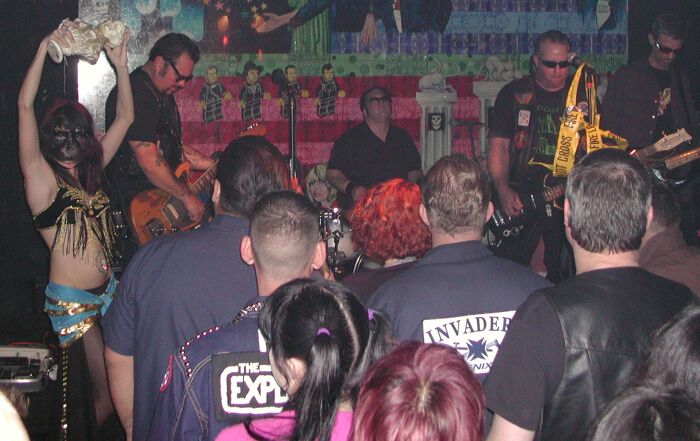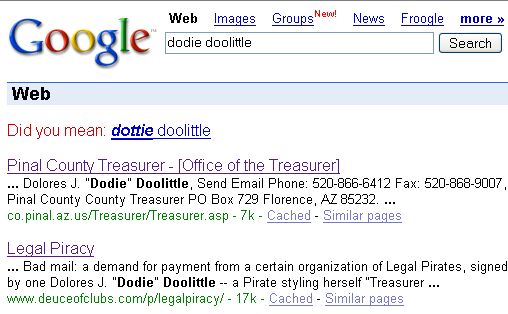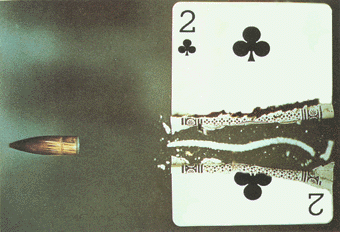

26dec2004 to This Very Daggone Minute
Junk you may have missed and yet managed to live happily without:
19apr2005 -- Special Bulletin: Ratzinger elected pope
Ratzinger?!? WTF? Nazi pants, people! NAZI PANTS!
(The Godfried Danneels site marches on, however, unlike Ratzinger's fan club site, which is down "due to maintenance downtime or capacity problems.")
19apr2005 --
BOB LOG III: I can't believe I'm gonna do this...
CROWD VOICE: DO IT! DO IT!
BOB LOG III: ...I'm gonna sing a LOVE song!
CROWD VOICE: DON'T DO IT!!
18apr2005 -- A pleasantly disturbed Internet site


The website mottos just keep rolling in. . . .
17apr2005 -- [Louisiana's] executioner, who executed twenty men between 1983 and 1990, did work under a pseudonym, Sam Jones . . . but he became very much a public figure, and proud of it -- so much so that he was fired when Louisiana switched to lethal injection in 1990. If Sam Jones knew he was to be introduced to you at a party or picnic as the state executioner, he'd make his way unseen to the beer bucket, put his right hand in the icy water until it was cold, wipe it dry, then give a grim, hollow stare as he shook your hand. -- Ivan Solotaroff, The Last Face You'll Ever See: The Culture of Death Row (p. 26)
15apr2005 --
From LewRockwell.com:
[7-year-old] Elizabeth: "Do you have to pay taxes every year?"
Me: "I pay every month. When I get money from teaching, they say they want some of it. Every month, before I get a check from Wofford, they get some of it. Then every year I have to see if I’ve paid enough, and if I haven’t I have to send in more."
Elizabeth: "That’s bad. That’s stealing. You need the money to buy food, and a house, and a car. That’s breaking the seventh [sic] commandment. Why do they want the money? Just to keep it?"
Me: "No, they use it for various things."
Elizabeth: "Like what?"
Me: "Well, they buy tanks and airplanes, and pay soldiers and send them to Iraq. And they give some of the money to people they think need it."
Elizabeth: "That’s like robbing. Why do they do it?"
Me: "They think it’s OK. A lot of people think it’s a good thing for the government to do."
Elizabeth: "They think it’s OK?!? They’re like King John, with the people saying, "No more taxes, no more taxes!"
Me: "King John?"
Elizabeth: "Yes. The guy with the Magna Carta. We should have a Magna Carta."
Me: "We have a Constitution. That’s sort of like a Magna Carta."
Elizabeth: "Well, they’re not using it very much. When I grow up, I’m moving to England."
Me: "In England it’s worse. The taxes are higher."
Elizabeth: "Well, I’m moving to Krakatoa."
Me: "You mean Indonesia? The taxes are high there too."
Elizabeth: "Then I’m moving to Salzburg."
Me: "Austria? They’re high there too."
Elizabeth: "What? Then I’ll go to Antarctica."
Me: "They don’t have taxes in Antarctica. There’s no country there. But it’s cold."
Elizabeth: "Well, I’ll put on a million shirts."
14apr2005 -- What always happens when bureacrats create a black market
Anatomy professors had long sent their students roaming the countryside to acquire fresh corpses, taking advantage of the legal limbo of the dead. Yet such theft, while repugnant, was not deemed a crime until 1788, when Lord Kenyon, with recourse to no known legal precedent, simply made it so. The result of this new sanction drove up the price per corpse, ushering in a generation of professional body snatchers that would persist, in England, until 1832, when the passage of the Anatomy Act, which turned the unclaimed dead over to medical schools, put grave robbers out of business. Yet as late as 1850, when 700 bodies were stolen from graveyards in New York City alone, there seemed enough rogue anatomists and ambitious young researchers trolling American cemeteries to find a place in Ambrose Bierce's dictionary, published in 1911, the year McCurdy was shot, wherein "grave" is defined as " a place in which the dead are laid to await the coming of the medical student." Professional thieves generally worked in teams of two or three, under cover of darkness. For protection from locals, who were extraordinarily touchy about their stock in trade, and to consolidate territory and intimidate competition, they formed gangs. In England, the Ben Crouch gang was the most powerful cadaver cartel of the period prior to the Anatomy Act, supplying all the trade to the United Borough Hospitals and St. Bartholome's. Citizens retaliated against these depredations by hiring cemetery watchmen, by constructing grave yard watch houses, some with gun ports, or by rigging elaborate tombstone alarms, bombs, and mortsafes to foil Crouch's men. -- Mark Svenvold, Elmer McCurdy: The Misadventures in Life and Afterlife of an American Outlaw, (p. 133)
12apr2005 --
Mount Vernon Barracks [Alabama] was a military post on the Mobile River, some thirty miles inland. It lay in dense pine woods, on swampy ground. At Mount Vernon, the Apache craving for sun and space grew so intense that men climbed to the tops of trees just to see the sky. . . . A party of Boston society women . . . made an ostensibly sympathetic visit one December. The women were surprised at the depth of the Chiricahua longing for Arizona, "a country which the Apaches almost worship," as one later wrote. The women found the lame-footed chief Nana, well over eighty, especially disconsolate. "Do you love your own HOME?" he thundered at them through an interpreter. . . . At Fort Sill [Oklahoma] . . . for the first time in eight years, the Apache women gathered brush and built wickiups, using army canvas for covering in place of the traditional hides. At night, when they heard coyotes howl for the first time in eight years, the women wept. Learning that mesquite bushes grew only forty-five miles away, the Chiricahua begged permission to harvest the beans, which they had not tasted in almost a decade. In forty-eight hours, walking and jogging the ninety-mile round trip, they gathered three hundred bushels of the tiny brown fruit.
In 1898 . . . Geronimo attended the Trans-Mississippi and International Exhibition. There he did a good business selling autographed photos of himself and toy bows and arrows he had crafted. Then the promoters of the exhibition pulled their surprise: Geronimo was brought face-to-face with General Nelson Miles.
For [General George] Crook, eight years after the man's death, Geronimo still harbored a dark anger, but it was tempered with the respect the Chiricahua had always granted their finest enemy. In the case of Miles, Apache hatred was deepened with contempt for this general who led from the rear, who played with his sun-flashing toy, who hid behind his desk at Fort Bowie -- "a coward, a liar, and a poor officer," as Juh's son Daklugie would insist sixty years later.
The sudden encounter, before a large and eager audience, sent a paroxysm of rage through Geronimo's breast. His hands trembled, he broke into a sweat, and at first he could not find his words. For twelve years he had ached for the chance to confront the man who had betrayed his people. At last, through an interpreter, he spat out, "When we surrendered to you in Skeleton Canyon in Arizona you said we would see our families in Florida within five days; you said that all would be forgiven. You lied to us, General Miles."
Playing to the crowd, Miles rejoined, "I did lie to you, Geronimo, but I learned to lie from you, Geronimo, who is the greatest of all liars."
In an effort to convey the pain of his people's separation from their homeland, Geronimo spoke in the animistic tropes of Apache oratory. "I have been away from Arizona now twelve years," he said. "The acorns and piñon nuts, the quail and the wild turkey, the giant cactus and the palo verdes -- they all miss me. They wonder where I've gone. They want me to come back."
Miles chuckled. "A very beautiful thought, Geronimo. Quite poetic. But the men and women who live in Arizona, they do not miss you. They do not wonder where you have gone; they know. They do not want you to come back. . . . The acorns and piñon nuts, the quail and the wild turkey, the giant cactus and the palo verde trees -- they will have to get along as best they can -- without you."
As Miles smirked, Geronimo stormed out of the room. The two never saw each other again.
Eighty years on, it seems unfathomable that white Americans could have found no way to coexist, in all the empty magnificence of the Southwest, with a mere twelve hundred Chiricahua -- roughly the population today of such wayside Arizona hamlets as Pima or Morenci. The heartland of the Apache, upon which even the caravans of modern tourism have left little mark, pulses with the absence of the people who knew and used that wilderness best.
Along the rocky terraces above Aravaipa Creek, the saguaro blooms; its green fruit bulbs and withers, untasted by the human tongue. In the Dragoon Mountains, close by Cochise's bones, the mesquite branches load each August with beans that drop ungathered. The junipers and piñons yield their crop on slopes where only ground squirrels scavenge. Each May the agaves swell with the moisture of the soil, but no women come to dig their roots and bake the fleshy mescal hearts beneath the ground.
The sacred pool at Ojo Caliente brims in the silence, spilling toward the canyon where a thousand swallows dart and sing; the red face-painting clay sleeps in its geologic bed. In Apache Pass, the spring that Mangas nearly gave his life to hold seeps in its shadowy cranny, drunk only by the animals. Over Turkey Creek the hawks soar on spirals of wind, while the tall pines drift and toss and no one sees them.
Upstream from Cañon de los Embudos, the chipped flakes, black and gray and ruddy, disappear under each summer's shifting sand, where no fingers shape the flint. High in the Sierra Madre, the zigzag trail to Juh's Stronghold lies covered in the swaying grama grass. The deer flit safe beneath the cottonwoods along the blue Bavispe River, where, with no human ear to wonder what they say, at dusk the coyotes yip and howl.
-- David Roberts, Once They Moved Like the Wind: Cochise, Geronimo, and the Apache Wars (pp. 302, 304, 306, 307-8, 315)
11apr2005 -- Overheard at the Post Office today:
"I got domestic violence and I got cancer." -- Oblivious postal clerk blandly informing a customer which stamps were in stock

|

|
|
(Artist's conception of kid's conception of Domestic Violence)
|
(Artist's conception of Picasso's conception of Cancer)
|
11apr2005 --
During the months that Cochise camped near Cañada Alamosa, the whites were not always sure precisely where to find him. Thus when sporadic Chiricahua attacks on settlers flared up as far afield as Apache Pass, Cochise was routinely blamed: soldiers swore that the tactics the warriors used were unmistakably Cochise's. The autonomy that lay at the heart of Apache life, dictating that each band had the right to seek its own battles, eluded the grasp of Americans who had just fought a great war to preserve their own nationhood. Among the Apache, even so great a chief as Cochise had no authority to order the humblest warrior into battle: the choice must be made of each man's free will each time. -- David Roberts, Once They Moved Like the Wind: Cochise, Geronimo, and the Apache Wars (pp. 91-2)
08apr2005 -- "The race to occupy the most expensive armchair of the world has begun...."
Geez can't a guy leave the state for a few weeks without a pope up n dyin?
• Belgian experts give Danneels only an outside chance, if his fellow cardinals cannot agree on one of the front-runners from Italy or Latin America. ``If that fails, then they will look for compromise figure and the name of Cardinal Danneels comes up,'' said Rik Torfs, professor of church law at the Catholic University of Leuven. ``The longer the conclave lasts, the greater the chances of Danneels become.''
Meanwhile:
• An unofficial site dedicated to Cardinal Godfried Daneels of Belgium pushes him forward as a possible papal successor.
"The next time the white smoke wafts its curly way from the Vatican chimney to heaven, let's all hope the holy skywriting spells DANNEELS," it declares.
• La guerra ha comenzado: El fenómeno fan comienza a dejarse ver en el mundo de los papables. Un hombre ha comenzado una campaña por el cardenal belga Godfried Dannels, porque comparten apellido. En deuceofclubs.com se puede leer “La guerra por el Papado ha comenzado”. Allí mismo se explican las razones por las que Daneels debe convertirse en el próximo Papa e incluso puede encontrarse un autógrafo del “próximo Papa”.
• Un hombre inició una campaña por el cardenal belga Godfried Danneels porque comparten un apellido: "La próxima vez que la fumata blanca se eleve ondulante desde la chimenea del Vaticano hasta el cielo, esperemos que el sagrado humo deletree ¡DANNEELS!", dice la web www.deuceofclubs.com/danneels/danneels.htm.
• Unofficial fan sites spring up: Other potential popes, such as Austrian Cardinal Christoph Schoenborn, publish sermons, essays and favourite quotes online, while fans of some Princes of the Church have set up unofficial Web sites to promote their favourites.
One man started a campaign for Belgian Cardinal Godfried Danneels because they share a surname:
"The next time the white smoke wafts its curly way from the Vatican chimney to heaven, let's all hope the holy skywriting spells DANNEELS!" says the site.
And my favorite so far:
• Emisión especial de la TotusTuus Network: (mmmpphh! XD) La carrera por ocupar el sillón más caro del mundo ha comenzado. Hagan sus apuestas! Le gusta el amigo "FRITO :) por Dios"?
Now in development, the gripping papabile saga: Fried by God: The Miniseries.
17mar2005 -- I'm off to Florida to pick up my new (old) van. If you're more or less on the route between Florida and Arizona & would like to meet Wagner & eat pancakes or something, email me. I'm not sure how, or how often, I'll be checking email, but junkies can't say no for long.
16mar2005 --
Even the best sources do not amount to much unless they are organized. For that, I turned to modern technology. Though I bought my first computer for its word processing capabilities, I soon began experimenting with a database program in hopes of storing and working with historical information. I used microfilm purchased from the National Archives, inputting synopses of each and every document found in the eleven-thousand-page Lincoln Assassination Suspects file. Through trial and error, I found ways to organize and sort this data by hundreds of different criteria. I could call up everything that happened in Surrattsville, in chronological order, during any time covered in the records. I could quickly find any event that involved, say, George Atzerodt, and I could sort those entries by date, by place, or by the names of other people mentioned in the same context. I could list all the arrests of suspects, all of Booth's arrests, all financial dealings, and all references to his horse, his health, or the quality of his voice. Without being sorted or analyzed, all these government records meant very little.
The event-based system I devised was far different from the statistical models used by most historians, and it may actually be unique in the way it applies technology to the study of historical developments. Most important, it works. It brought to the fore new relationships among the plotters, unnoticed patterns in Booth's behavior, and a fresh significance to events I once considered unimportant. All this has given me a clearer picture of the Booth conspiracy -- including events no writer had previously noticed. I found recruiting trips, secret meetings, and a dozen visits by Booth to New York City -- which suggest a Northern connection that, in light of this long neglect, may never be explained. By sorting events over time, I could see how one conspirator fades from the scene while another is shoved into his place. I got a sense of how much work and money went into the plot. I noticed how carefully choreographed the scheme really was. But most surprising of all, I learned how Booth managed to organize and run a dangerous plot -- undetected -- in the face of unprecedented government paranoia.
Michael W. Kauffman, American Brutus, pp. xiii-xiv.
15mar2005 -- This phrase demands widespread currency: "bureaucratic bully
12mar2005 -- Today at the St. Patrick's Day parade, a Viking kidnapped two Irish wenches and tried to take them in his ship back to the land of the North-men—with a detour through a Phoenix park. He was stopped only when the height of his ship's mast prevented him from escaping under the overpass.
08mar2005 -- Accurate About Nonsense
A teacher writes: "it's that time again for my students to evaluate DOC (among others).
i'm observing their computer screens surreptitiously. one made a note that the site is "accurate about nonsense," and i just caught another one looking up "mandible."
And thus was another Deuce of Clubs motto born (see home page, left panel).
07mar2005 --
Saturday Night Special: Simiana and Deadbolt at the Rogue

03mar2005 -- The whole thing in 2000 was bizarre. Here you have this serious presidential campaign, and all of us had to go on these comedy shows like Saturday Night Live, because that was the only way we could have more than a sound bite and reach a large audience. This is the land of the free, the home of the brave, 285 million people with endless numbers of channels, and they're all closed off. -- Ralph Nader (quoted in Live from New York: An Uncensored History of Saturday Night Live), p. 448)
01mar2005 --
"Rebels," [Lincoln] once commented to Salmon P. Chase in a discussion over the legality of a fiscal proposal, "are violating the Constitution to destroy the Union. I will violate the Constitution, if necessary, to save the Union: and I suspect, Chase, that the Constitution is going to have a rough time of it before we get done with this row." (From Webb Garrison's The Lincoln No One Knows, pp. 244-5.)
. . . an editorial in the London Examiner . . . said, "It must be remembered that atrocious as was Booth's deed, his `sic semper tyrannis' was literally justified by the facts. The man he killed had murdered the Constitution of the United States, had contradicted and set at naught the principles under which the States came together, had practically denied the competence of the signatories of the Declaration of Independence, and overthrown all for which Washington fought and Patrick Henry spoke." (From Michael W. Kauffman's biography of John Wilkes Booth, American Brutus, p. 236-7.)
26feb2005 -- In the 1990s, only two big men -- Shaquille O'Neal and Tim Duncan -- have come into pro basketball and made a real impact, but Shaq hasn't developed into a complete player. In addition to that, he hasn't shown much respect for the kind of basketball that was around long before he arrived on the scene. He's publicly referred to the way I used to play as 'old man's basketball,' which it may have been, but it earned me six more rings than he's got so far. -- Kareem Abdul Jabbar, A Season on the Reservation (p. 43-4)
(O'Neal has since cut the margin to three rings.)
25feb2005 -- House of Flying Daggers was dedicated to the memory of Anita Mui -- I hadn't heard that she died. Everyone watch Heroic Trio today.
24feb2005 -- A pair of sentences implausibly occurring in the same book:
Taking advantage of the opportunity and the eager audience to pass along the intricacies of inside baseball, the Mentor makes the batboy aware of nuances, sensitive to rhythms and trends, and appreciative of the possession of arcana. The gift of Dutch Uncle is maturity, of Big Brother nurturance, and of the Mentor illumination. They are the magi of the batboy's emergence.
Barney McCoskey, practically a rookie ... came up to [Rudy] York and challenged him to a test of strength. "I'll bet you," he said, "you can't stand on a bat -- any bat -- and lift yourself up." Rudy, who knew he could lift his own weight easily, said, "The hell I can't -- and I'll use my own bat." For fifteen minutes he struggled and strained, with everyone laughing, getting more and more frustrated, until he figured out that it couldn't be done.
-- Neil D. Isaacs, Batboys and the World of Baseball (pp. 73, 125)
(Further batboyishness)
23feb2005 -- R.I.P. w. euGene Scott, Ph.D. (Gene Scott)
21feb2005 -- As a species, we are so mentally unprepared for the playa that we cannot see it for what it is. Without the visual benchmarks of the mixed woodlands and savanna landscapes in which we evolved as hominids -- without trees to show us our scale in the landscape and without humidity to fade the mountains with distance -- we are lost. We have no ingrained mental templates to help us gauge how large or how small we are in the space we occupy, how far it is to water or even to the next person. What looks like a car a mile away turns out to be a tin can resting on its side. What looks like an hour's walk is more than a day off. Light comes from every angle.
Such cognitive dissonance can kill you, or it can be used to your advantage. People die on the Black Rock every year because they misjudge its size and scale and their place within it. But it is also where the fifth-largest city in the state is created for a week prior to Labor Day weekend, when more than 25,000 people gather to celebrate the Burning Man Festival. The absolute absence of familiar surroundings, the lack of earthly constraints, allows for and encourages people to experience the planet in a profoundly different manner. Some people temporarily lose their social restraints during the gathering, while others make up fresh rules; marriages fall apart, but new relationships form; people change their mind, their career, their religion during Burning Man, and it's mostly the result not of artificial chemical alterations but of the under-appreciated yet overwhelming influence upon them of a geography so extreme they're knocked out of customary notions of space and time.
[ . . . ]
Parallel to the highway is Guru Road. Predating Burning Man by several years, it was at first the ongoing outsider art project of DeWayne Williams, a Gerlach resident who etched homilies on chunks of granite washed out of the mountains that rise north of the dirt road.... This linguistic assemblage has its origins equally in prehistoric rock art and in the huge whitewashed capital letters that schools erect on hillsides above their towns in the arid West, both messages proclaiming allegiance to locale.
-- William L. Fox, The Black Rock Desert, pp. 9-10, 70.
16feb2005 -- Sights & sites in the LA area:
Rode the 100+-foot-drop swinging cable ride at Pharaoh's Lost Kingdom (implausibly located in Redlands); drove in the lane beside Angelyne, who was tooling down Sunset in her pink Corvette, but before I could get camera and statue at the ready, she executed an evasive maneuver near Seward and disappeared; ate at Pann's Diner; visited the now unscaffolded Watts Towers; snuck through the fences at the Pallette Tower (where Daniel Paul suggested a cleanup would make the tower "more palatable"); hung out with the Swearing Turtle at the Old Trapper's Lodge (at Pierce College of Agriculture); visited with Sven at Tiki Central. The final morning began with the arrival of cops, noisy trucks and noisy personnel at the Elan Modern hotel. I thought maybe it was a hostage standoff in progress. A mustachioed cop, upon being asked, "What you got going on here?" answered, "I dunno. CSI, I think." How very L.A. (Photos to follow in due course, which is to say, someday.)
A few of the trip questions that got learned upon return, presented in non-parallel (not unparalleled) construction:
=+= Why is Desert Center there, and what was it?
=+= Fancy, as applied to foods: "U.S. Grade A or U.S. Fancy fruits are the very best quality, with excellent color, and uniform size, weight and shape. Having the proper ripeness and few or no blemishes, fruits of this grade are excellent to use for special purposes where appearance, size and flavor are important. Fruit of this grade is the most flavorful and attractive -- and the most expensive." [Source]
=+= Watts Towers (which Simon Rodia called Nuestro Pueblo, "The Ship of Marco Polo," and "The Ship of Columbus") was intended to resemble a ship. We learned this from the tour guide who, though she was leaving to go watch the Super Bowl, gave us the coolest one-minute speedtalk tour ever. ("I didn't know that," I said, referring to the ship revelation. "Of course you didn't!" she said.)
=+= You can buy smells from Dale Air, such as jaguar urine, Tyrannasaurus Rex breath, otter crap, and the smells of a Viking village, New York tenement, or Roman soldier's armpit.
=+= Movies filmed in Detroit, Michigan.
=+= Tonopah is Shoshone for "little water," but why there is a Tonopah, Arizona and a Tonopah, Nevada is apparently a mystery.
Questions as yet unanswered (in yet further non-pareil-ism):
=+= Where have all the Los Angeles pigeons gone? We saw hardly any. Not a bad thing, just a curious thing. (Could toy snakes be the heroes here? Or perhaps the makers of Nixalite?)
=+= How the word notions (as used in the world of sewing supplies, for example) came to mean "small, useful items."
=+= The origin of the phrase continental breakfast. (A Google search of "called continental breakfast" yields loads of unfavorable motel and hotel reviews with the phrase "so-called continental breakfast.")
=+= Wherever it was, Phoenix's Revlon plant closed in 2001, so that plant or factory with the smokestacks out in the middle of the desert west of Tonopah is what, then?
15feb2005 -- Anyone out there know Cher, or know a reliable way to contact her? I want to interview her on a single subject, no controversy, won't take but five or ten minutes of her time. If you can help, please contact DoC.
13feb2005 -- So that's why people call them heroes...
In 1992 the commander of the New York chapter of the Sons of Union Veterans said that "it wasn't because our fathers knew what they were fighting for that they were heroes. They didn't know what they were fighting for, exactly, and they fought on anyway. That's what made them heroes." -- James M. McPherson, What They Fought For, p. 2 (quoting New Yorker, 18may1992, p. 31)
10feb2005 -- Even though juries are "safer" than judges, they are not automatically sympathetic. Bear in mind that a jury trial means you will be watched by 12 of the squarest people within a hundred miles. These are the people who couldn't think of a reason to avoid jury duty. These people have demonstrated to the satisfaction of at least two opposing lawyers and a judge that they have no real opinions on anything. They are people who have an abiding respect for authority, dullards at best, reactionaries at worst. They are going to watch you for the slightest sign that you did it. They believe everything the judge says and they are going to either punish you or set you free on essentially the same basis as they vote for politicians. -- Jim Hogshire, You Are Going To Prison (Loompanics, 1994), p. 52.
09feb2005 -- The bally is the Siren's call to Odysseus across the waters, directing his attention away from the wreckage on the shore. It is Moses turning his staff into a serpent, wowing the children of Israel. The bally, the big buildup of rhetorical embellishment, is Marco Polo, changing the title of his thirteenth-century book of travels from the prosaic Description of the World to something that would be at home on any carnival banner: Million's Book of the Great Wonders of the World. Bally rhymes with rally and has in common with inflated stock prices and political campaign promises the simple key to any con -- that all such games depend upon willing victims to suspend their disbelief, to forget that at the heart of the exchange is an emptiness that needs puffing up. The bally is the promise driving a sentence the way vacuum propels an engine. It is the booming voice of Oz -- child, look not behind the curtain! It is father to the ad man. It is the promise and the sham at the heart of the world.
Look up from the page, dear reader -- you've paid retail all your life -- and tell me you don't prefer the bally.
-- Mark Svenvold, Elmer McCurdy: The Misadventures in Life and Afterlife of an American Outlaw, (pp. 149-50)
(See also)
04feb2005 -- Fresh from the We Who Are About to Roadtrip Despise Thee Dept: Big Brother On Board
03feb2005 -- Query: Would there happen to be any mechanically inclined persons in the area of Olympia, Washington who could take a look at a sweet van for me?
02feb2005 -- Ladies and Gentlemen, This Is Your Captain Speaking
That reminds me of this America Worst flight I was on back when I pretended to work for them. The pilot announced, "Off to your right you can get a beautiful view of the Grand Canyon." Then a couple of beats. Then the plane dipped sharply to the right. People gasped. Drinks were spilled. A crackling chuckle was heard over the intercom. "Don't y'all rush over there at once, though, heh heh heh."
There were some nasty looks for that pilot from disembarking passengers that day.
Totally unrelated in any way I can make out: Death and Taxes: A visual look at where your tax dollars go
Which ultimately leads us to: "Eminent domain takes aim at life's work"; "`Blighted' homes in Norwood, Ohio"; "If you don't take a job as a prostitute, we can stop your benefits"; "Congress proposes tax on all Net, data connections" ("An influential congressional committee has dropped a political bombshell by suggesting that a tax originally created to pay for the Spanish American War could be extended to all Internet and data connections this year.")
31jan2005 -- If anyone happened to keep in contact with, or knows the current whereabouts of, Rick Karr, the Texan who camped at the Mojave Phone Booth for a few weeks in 1999 and read Bible or sermon excerpts to callers, please contact DoC. Karr would be about 57 years old or so now, and had maybe lived in Needles, California or Parker, Arizona (or maybe both).
28jan2005 -- I dreamed I was watching the same training film, over and over again. Then I was in the training film, and I was being trained by a dolphin with a camera strapped to its head to film rocket launches taking place beside a calm bay. After firing, the rocket would move laterally to hover upright over the water, submerge, then launch from underwater. This is what I was supposed to film. Okay. Understood. Except when it came time for me to do the filming, I'd keep filming the dolphin with the camera strapped to its head. So the dolphin, looking into my camera, kept having to motion with its camera-strapped head toward the rocket, as if to say: No, no. Over THERE. The ROCKET. Film the ROCKET.
As all that was going on, I dreamed that I came up with a new rhyme for the word phantom. The rhyme was frantom. Dreaming can be kind of like being high.
27jan2005 -- Gold is most likely one of the first metals to be used by humans, though copper may also share that distinction. Both occur naturally as a shiny native metal. On average, gold represents only about one to two atoms of every billion in the earth's crust. All the gold ever mined since the dawn of civilization probably totals less than 115,000 tons.... Because of its high density, you could fit all the gold ever mined within a cube slightly larger than 60 feet by 60 feet by 60 feet. -- From Rich Hill: The History of Arizona's Most Amazing Gold District (by M. Katherine Crombie, Chris T. Gholson, Dante S. Lauretta, and Erik B. Melchiorre)
26jan2005 -- L.A. Times article abstract: A 22-foot tower of wooden pallets, which became a historic monument in 1978, may have to topple to allow development.
It's unclear how serious members of the Los Angeles Cultural Heritage Commission were back in 1978 when they designated Daniel Van Meter's "Tower of Wooden Pallets" a historic monument. Commission member Bob Winter later joked that "maybe we were drunk" when they recognized the 22-foot stack of crumbling, termite-infested Schlitz beer pallets. Winter called it "the funniest thing we ever did."

In 2000, Van Meter died at age 87, and his family took over the lot on Magnolia Boulevard in Sherman Oaks. Now his heirs, who never liked the tower and were often at odds with its eccentric creator, want to clear the land of feral cats, strange plants and the tower itself so a developer can put up 98 apartments.
Not so fast, said some of Van Meter's neighbors, who had developed an affection for the courtly old man. They professed to admiring the tower. They also made no attempt to hide their dismay at the traffic that 98 apartments would bring to their quiet, block-long cul-de-sac.
Six decades later, a real estate broker representing the Van Meter heirs, [claims] that Van Meter should not be sanctified as a folk artist. "He was a conniver, a schemer, and a manipulator," wrote Hal Wheatley. He did not create art, Wheatley said. "Instead, he used his eccentric creation to justify a deeply selfish motive — avoidance of societal regulation."
In those days, Van Meter's creation was one of the higher points in the San Fernando Valley. He would climb up and gaze at the orchards and fields as they yielded to the relentless advance of subdivisions. "To me, this is a spiritual place," he once said. Van Meter never married and left no descendants. He supported himself with odd jobs and lived in a bungalow on Magnolia Boulevard. In a 1980 interview with The Times, he said he had just one life and would spend as little of it as possible working.
It was not just Van Meter's artistic vision or mystical claims that persuaded commissioners. It was Van Meter himself. "He was a character," recalled Winter, the former commissioner.
Westgate recently reached a compromise with many of the neighbors and the Hebrew academy, agreeing to add parking spaces and redesign the apartment complex's windows so they don't directly face the school's classrooms. With that agreement, an ending that Van Meter anticipated in 1978 could be imminent. "In a few years," he wrote then, "this piece of the good earth may be covered by apartments for the storing of surplus people."
Some neighbors say they are resigned to the tower's destruction. "It's sad," said Nancy Cohen, who can see the pallets from her bathroom window. "Here was this man who lived the way he wanted to live, and now it's going to go modern. The last piece of pleasure in the Valley."
Update, 02feb2005: See also this related story from the Orlando Sentinel, sent along by Babsomatic:
The Seminole County man who defied authorities for more than a decade by stockpiling junk in his front yard was sentenced Monday to three more years in prison. It is one of the harshest sentences ever imposed in Florida for someone whose crime was being messy.
Once, when a judge ordered him to move the trash, he put it on his roof. Another time, when a judge ruled against him, he made a giant sculpture of a derriere, hitched it to his truck and drove it to the courthouse.
Circuit Judge Kenneth Lester Jr. not only agreed that Davis was wrong, he slapped Davis with three years in prison -- three times what Rutberg sought. "Mr. Davis is marching to the beat of his own drum at all times," the judge said.
Davis, 49, a mechanic and welder, showed no emotion. He merely mouthed "goodbye" to his wife, who sat on the opposite side of the courtroom, and when the judge asked whether he were going to appeal, answered in a loud, clear voice, "Yes, I am."
[S]ome say prison is exactly where he should be. "He's his own worst enemy," said Carl Jowell, who lives two houses down. "He defies logic. He defies the law. I suppose that's where he belongs, in jail." But next-door neighbor Irma Ramirez said just the opposite. Davis has been messy, she said, but he's otherwise a wonderful neighbor. He cleared hurricane debris from her yard without being asked; he lifted her sickly mother into bed when she fell; he repaired her car when she couldn't get it started. She called his prison sentence "awful. He doesn't deserve to be in jail."
His probation officer, Lee Goodwin Jr., accused Davis of letting the battery on his electronic monitor go dead, thereby making him impossible to track by satellite.
Seminole code-enforcement officer Dot Hird testified that, in mid-October, she found high weeds and something that looked like part of an airplane in his yard. She wrote him a letter, asking him to clean it up.
Davis testified that he pitched the letter into a file with others just like it and hadn't bothered to respond.
He will likely spend 2½ years locked up, then another year on house arrest.
24jan2005 -- "New York Sun, March 16, 1890 -- that, at 4 o' clock, in the afternoon of March 12th, in the sky of Ashland, Ohio, was seen a representation of a large, unknown city. By some persons it was supposed to be a mirage of the town of Mansfield, thirty miles away; other observers thought that they recognized Sandusky, sixty miles away. `The more superstitious declared that it was a vision of the New Jerusalem.'
May have been a revelation of heaven, and for all I know heaven may resemble Sandusky, and those of us who have no desire to go to Sandusky may ponder that point."
-- Charles Fort, New Lands (1923; rpt. New York: Ace Books, 1973), p. 146.
23jan2005 -- You know, we armed Iraq. I wondered about that, too. During the Persian Gulf War, those intelligence reports would come out:
"Oh, Iraq? Incredible weapons. Incredible weapons."
"How do you know that?"
"Well. Ha, ha. Ahhh, we looked at the receipt. But as soon as that check clears, we're going in."
-- Bill Hicks
22jan2005 -- I believed I was the coiner of the word foodamentalism (n. -- food Nazis). But I find that I am not.
21jan2005 --Bill St. Claire visits Legal Piracy and Switcheroo; Legal Piracy has hit #2:

Are you ready for your vanity search, Frau Doolittle?
20jan2005 -- Speaking at his $40-million-dollar coronation party, Emperor Bush is basically repeating freedom, free, and liberty about eleventy-hundred times [49 in about a twenty-minute spiel, actually, is the final count.]. That sort of thing is sufficient to get one re-elected president, but those who'd prefer to hear something meaningful about liberty can switch off that twit and read things such as the following aloud to themselves:
Whenever a single definite object is made the supreme end of the State, be it the advantage of a class, the safety or the power of a country, the greatest happiness of the greatest number, or the support of any speculative idea, the State becomes for the time inevitably absolute. Liberty alone demands for its realisation the limitation of the public authority, for liberty is the only object which benefits all alike, and provokes no sincere opposition. ("Nationality," 1862)
Liberty is not a means to a higher political end. It is itself the highest political end. ("The History of Freedom in Antiquity," 1877; full text)
The danger is not that a particular class is unfit to to govern. Every class is unfit to govern. (Letter to Mary Gladstone, 24apr1881)
Power tends to corrupt, and absolute power corrupts absolutely. (Letter to Mandell Creighton, apr1887)
-- John Emerich Edward Dalberg (Lord Acton), 1834-1902
19jan2005 --
Desert Mountains Require Monograms
Hillside Letters: In Plain Sight But Not Intended for Planes
18jan2005 -- "The first real breach in the Constitution was made by the invention of the war power to enable President Lincoln to abolish slavery. No one would now say that this was not at that time necessary, but it made it possible for any President practically to suspend the Constitution by getting up a war anywhere." -- Editors of Nation, just after the end of Lincoln's War (quoted in Webb Garrison's The Lincoln No One Knows, which also [on p. 132] includes a hilariously appropriate typographical error: Lincolon.)
15jan2005 -- Under the current political setup (sometimes referred to as "Democracy in America"), We the People have little more say in our lives than children in a government-run school. So, like children, we doodle unflattering portraits of our oppressors.
Related: 16jan2005 -- The rulers of Cochise County declare themselves bosses of what you can build on your own property. (Link via Tigranes)
Choice quotations: "Before it was the Wild West. You could do anything you wanted to, you were being responsible for what you do on your land. The code says the county is taking responsibility for what you do on your land, and you're going to have to go to them and ask permission to do whatever it is you want to do."
"What people lose is freedom."
"I do not care to live, and wish the rocks to fall on me and cover me up." -- Cochise, Apache chief
12jan2005 -- So, this guy who used to get paid for using force on people decided he no longer wanted to use force on people, but the guys who forced him to use force on people said they were going to force him to keep using force on people, so when these other guys who get paid to use force on people showed up to force him to go back and use force on people, the guy ... used force on them.
11jan2005 -- "Good Lord," Bastiat sighs, "what a lot of trouble to prove in political economy that two and two make four; and if you succeed in doing so, people cry: 'It is so clear that it is boring'. Then they vote as if you had never proved anything at all". ("The Seen and the Unseen")
10jan2005 -- Appropriately enough, I Shit My Pants is Number Two:

06jan2005 -- Property taxes, properly understood:
For five hundred years the Spartans lived in a changeless commune. King Agis IV tried to raise the standard of living; the Spartans killed him. They continued to live as cells of Sparta until less communistic Greeks defeated them in war and destroyed the commune.
Twenty years ago the Dukhagini in the Dinaric Alps were living in the same obedience to their Law of Lek. I tried for hours to convince some of them that a man can own a house... I said that in America a man owns a house. They could not believe it; they admired America. They had heard of its marvels; during the recent world war they had seen with their eyes the airplanes from that fabulous land.
They questioned me shrewdly. I staggered myself by mentioning taxes; I had to admit that an American pays the tribe for possession of house. This seemed to concede that the American tribe does own the house.
-- Rose Wilder Lane, The Discovery of Freedom, pp. 7-8.
(If you believe that you actually own property, try this experiment: tell the local political lords that you won't be paying property taxes any longer and see how long you manage to retain possession of "your" property.)
05jan2005 -- I didn't think anyone would dare to apply Bastiat's Broken Window fallacy to the human tragedy that is still playing itself out along the rim of the Indian Ocean, but sadly, faith in economic fallacies is even more common than deadly tsunamis.
03jan2005 --
If you do external exercises,
you must do internal exercises.
If you do internal exercises,
you may forget to practice external exercises!
-- Chiastic frontispiece aphorism from Stephen T. Chang's The Book of Internal Exercises (which I got at a yard sale yesterday, for its bizarre photographs)
01jan2005 -- Even aside from the fact that both sequences improbably feature Jeff Goldblum, did the striding togetherness behind the credits of The Life Aquatic with Steve Zissou remind anyone of the same thing from The Adventures of Buckaroo Banzai Across the 8th Dimension?
30dec2004 -- Yesterday this lazy, surly postal clerk tried to lump together all three of my packages, rather than do the thing right, which is to put the zip code into the postal meter for each package, so that one gets a proper itemized receipt. Inputting the zip code also eliminates lost packages arising from erroneous zip codes (which sometimes happens because, amazingly, some people who order things via the internet seem not to know their own zip codes).
Me (as she tried to piggyback the second package): I'm going to need an itemized receipt, please.
Surly postal clerk: I'm not obligated to do that.
Me: What?
Surly postal clerk: I said, I'm not obligated to do that.
Me: What good is a receipt with a lump sum just chalked up to "Postage?" Why give me a receipt at all, then?
Surly postal clerk: If you want Delivery Confirmation, you have to pay for it.
Me: I don't want Delivery Confirmation; I want a receipt for the services I've paid for, same as I get anyplace else.
Surly postal clerk: Proof of delivery costs extra.
Me: As postal clerks have often and uninvitedly informed me, your receipts do not constitute proof of delivery. I fully understand that. What I want is a receipt. If I go to a real store -- any real store -- and buy a bunch of stuff, I don't get a receipt that just says "Stuff."
Surly postal clerk: I'll do it for you. Let's end it at that.
Me: Every other postal clerk gives me an itemized receipt. You're the only one who's ever made an issue of it.
Surly postal clerk: It just makes it more convenient.
Me: More convenient for you, sure. I can see that. But it's inconvenient for me, the customer.
Surly postal clerk: It's better service. So people don't have to wait in line as long.
Me: If the post office cared about better service and people waiting in line, they'd ... never mind. Like you said, leave it at that.
"The case for privatizing the Postal Service is clear," writes Cato's director of regulatory studies Edward Hudgins in the introduction to the new Cato book The Last Monopoly: Privatizing the Postal Service for the Information Age. "The Postal Service survives through sheer political power, not through its ability to satisfy customers." [More]
28dec2004 -- What can we say of a writer who, having seen men literally flattened by shelling at the Somme, finds himself able in later years to write lines like "God bless Mummy. I know that's right / Wasn't it fun in the bath tonight?" -- James Parker on A. A. Milne's treacly Winnie the Pooh dreck in "Jeeves vs. Pooh." [Wodehouse] had his revenge on Milne, satirizing the Christopher Robin shtick in stories like `Rodney Has a Relapse,' but history would avenge him over and over -- remembering Milne as a writer for the nursery, and Wodehouse as one for the ages.
26dec2004 -- Over a year ago, Jess wrote:
Did you ever hear the story about the guy who dreamed he refuted all the great philosophers? They would come up to him in turn, explain their ontologies and epistemologies and whatnot, and he would make a statement to each that was so devastating they had no way to defend their views.
When he woke up he was really excited to have found this universal refutation, so he wrote it down on a pad by his bed and went back to sleep.
In the morning, he read what he'd written on the pad. It was, "That's what YOU say."
Which sounded to me very much like an experience this old counterculture casualty from the 60s I used to know claimed he'd had while tripping on LSD. During a party at his house, he said, he was suddenly given THE revelation: the big one, The Meaning of Everything. Even in his scrambled state he realized he had to write this down to share later with the world. He scrambled around the house looking for something to write with and something to write on, scribbled it down, then fell back into his trip.
Coming to on the floor the next morning he suddenly remembered: My vision! He commenced to tear apart the house looking for the scrap of paper he thought he remembered writing it on. Finally his eyes fell upon a crumpled store receipt that he recognized as his vehicle of revelation. He uncrumpled it and read, in his handwriting, the words:
"This room is filled with smoke."
It always seemed too good a story to believe, especially from an old hippie who was not known for his conformity to the truth (for example, he claimed that the station wagon in his back yard was the one in which the Beatles escaped Shea Stadium). Since the advent of the web I've periodically searched for "this room is filled with smoke" and variants thereof, and come up with nothing. A couple of weeks ago, however, I came across the following passage in Paul McCartney's Many Years From Now (p. 189)
It developed into a bit of a party. We all went back out into the lounge and drank and whatever but I don't think anyone needed much more pot after that. That was it! I spent the whole evening running around trying to find a pencil and paper because when I went back in the bedroom later, I discovered the Meaning of Life. And I suddenly felt like a reporter, on behalf of my local newspaper in Liverpool. I wanted to tell my people what it was. I was the great discoverer, on this sea of pot, in New York. I was sailing this sea and I had discovered it.
So I remember asking Mal, our road manager, for what seemed like years and years, "Have you got a pencil?" But of course everyone was so stoned they couldn't produce a pencil, let alone a combination of a paper and pencil, so it was I either had the pencil but I didn't have the paper or I had the ... I eventually found it and I wrote it down, and gave it to Mal for safekeeping.
I'd been going through this thing of levels, during the evening. And at each level I'd meet all these people again. "Hahaha! It's you!" And then I'd metamorphose on to another level. Anyway, Mal gave me this little slip of paper in the morning, and written on it was, "There are seven levels!" Actually it wasn't bad. Not bad for an amateur. And we pissed ourselves laughing, I mean, "What the fuck's that? What the fuck are the seven levels?" But looking back, it's actually a pretty succinct comment; it ties in with a lot of major religions but I didn't know that then.
For all I know, variations of this story date back to Homer. The most influence-influenced revelation I ever had occurred to me as I was rolling on the floor ("all gimped out," as a friend described it) and heard someone's voice in my head saying, "Yeah, great. I don't need drugs in order to roll around on the floor like a fool." To which another voice in my head instantly retorted: "Sure -- you could roll around on the floor like a fool without drugs. But you wouldn't feel like rolling around on the floor like a fool."
(See also)
Update, feb2005: Once, when I was high, I scribbled this tablet note from the opposite perspective: "Here I am, high, trying to remember an insight I had earlier when I was straight!" Then, I remembered, and wrote below that: "(The insight on the previous page.)"
(See also)
(And again: See also)
|



